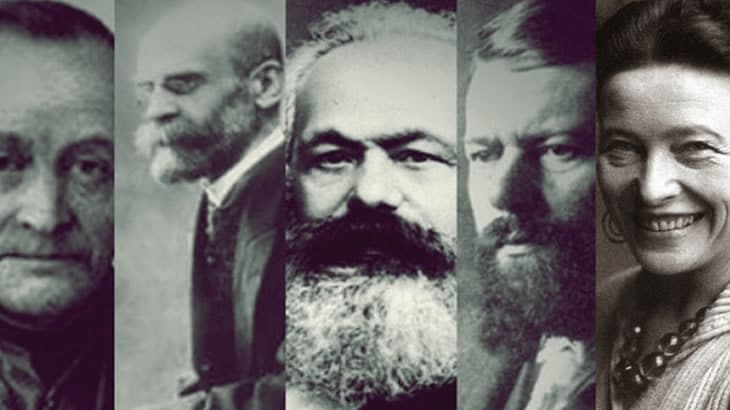درباره دوره:
در این درس مروری کلی بر نظریههای جامعهشناسی کلاسیک و متاخر خواهیم داشت. امیدواریم آشنایی اولیه با این نظریهها به شما در درک نظریههای دروس ترم آینده کمک کند و در نهایت از آمادگی لازم برای جستجو در زمینه رویکردهای نظری مرتبط با حوزه تحقیقتان برای نوشتن پایاننامه یا تحقیقات دانشگاهی دیگر برخوردار شوید. این درس در سالهای قبل فقط بر نظریههای کلاسیک تمرکز داشته اما به دنبال درخواست دانشجویان امسال برای اولین بار نظریههای متاخر هم به مباحث این درس اضافه شدهاند و اساتید متعددی برای تدریس طیف گستردهای از رویکردهای نظری در این درس مشارکت خواهند کرد.
اهمیت نظریه در جامعه شناسی
مانند تمامی علوم، شناخت ما از جامعه توسط نظریههای جامعه شناسی بسیار بازتر خواهد شد. همانطور که در زبانهای اروپایی و همچنین در فارسی عنوان میشود، نظر با بینش انسان سروکار دارد. نظر کارش اینست که درک ما را از پدیدهها روشنتر سازد و آنها را برای ما بیشتر قابل درک کند. نیروی نظری انسان میتواند پدیدههایی اجتماعی، سیاسی و فرهنگی را که بسیاری از مردمان سالها و حتی قرنها با آن مواجه بودند و نمیتوانستند درک عمیقی از آنها داشته باشند برای ما روشنتر سازد. این موضوع در مورد علوم طبیعی هم صادق است. قرنها بود که انسانها مشاهده میکردند که اجسام سنگین که از ارتفاعی رها میشدند به سوی زمین سقوط میکنند ولی کمتر کسی از خود پرسیده بود که چرا چنین است. اما نیوتن چنین پرسشی را مطرح کرد و آنرا با نظریه نیروی گرانش توضیح داد. ابن خلدون را بسیاری از بانیان نگرش نظری به جامعه میشناسند. بسیاری در زمان او حتی آگاه نبودند که تمدن اسلامی در حال زوال و افول است، اما ابن خلدون نه تنها در زمان خودش به این پدیده پی برده، بلکه سعی داشت با دیدگاه نظری آنرا را تبیین کند و از آن طریق چاره ای بیاندیشد.
شکی نیست که در علوم انسانی در بسیاری از موارد نظریهها میتوانند نزدیک به، یا خود اصلاً، ایدئولوژی باشند. در این کلاس ما سعی بر آن داریم که در دام ایدئولوژیها نیافتیم. برای رسیدن به این هدف لازم است که افرادی را که مورد مطالعه قرار میدهیم به صورت انسانهایی خطاپذیر تلقی کنیم، هرچند که گزارههای آنها بدیع و شایان توجه باشند. از این رو دانشجویان تشویق میشوند متنهایی را که با آنها مواجه میشوند با دید نقادانه مطالعه کنند. البته باید توجه داشت که نقد با انتقاد متفاوت است. نقد به معنی سبک سنگین کردن و نقاط قوت و ضعف را با هم در نظر گرفتن است. طریق دیگری که ما را از دام ایدئولوژی میتواند بر حذر دارد اینست که افکار نظریهپردازان مختلف را با یکدیگر مقایسه کنیم و جنبههای مثبت و منفی آنها را نسبت به یکدیگر بسنجیم.
بسیاری از نظریههای جامعه شناسی متون انتزاعی و مغلقی هستند که در قرن ۱۹ و ۲۰ میلادی به زبانهای اروپایی نوشته شده اند. هنگامی که بر این مسائل ترجمه فارسی را هم اضافه میکنیم، مشکلات بیشتر هم خواهند شد. از این نظرخواندن متون تئوریک صبر و دقت بیشتری را لازم دارد. گرچه بسیاری از نظریههایی که ما با آن مواجه خواهیم شد در دو قرن پیشین نوشته شده اند، اما هنوز برای فهم جامعه ما میتوانند کاربرد داشته باشند. با توجه به این نکته دانشجویان تشویق میشوند که از نظریهها و بینشهایی که در این دروس با آنها آشنا میشوند برای درک بیشتر جامعه و مسائل آن استفاده کنند.


